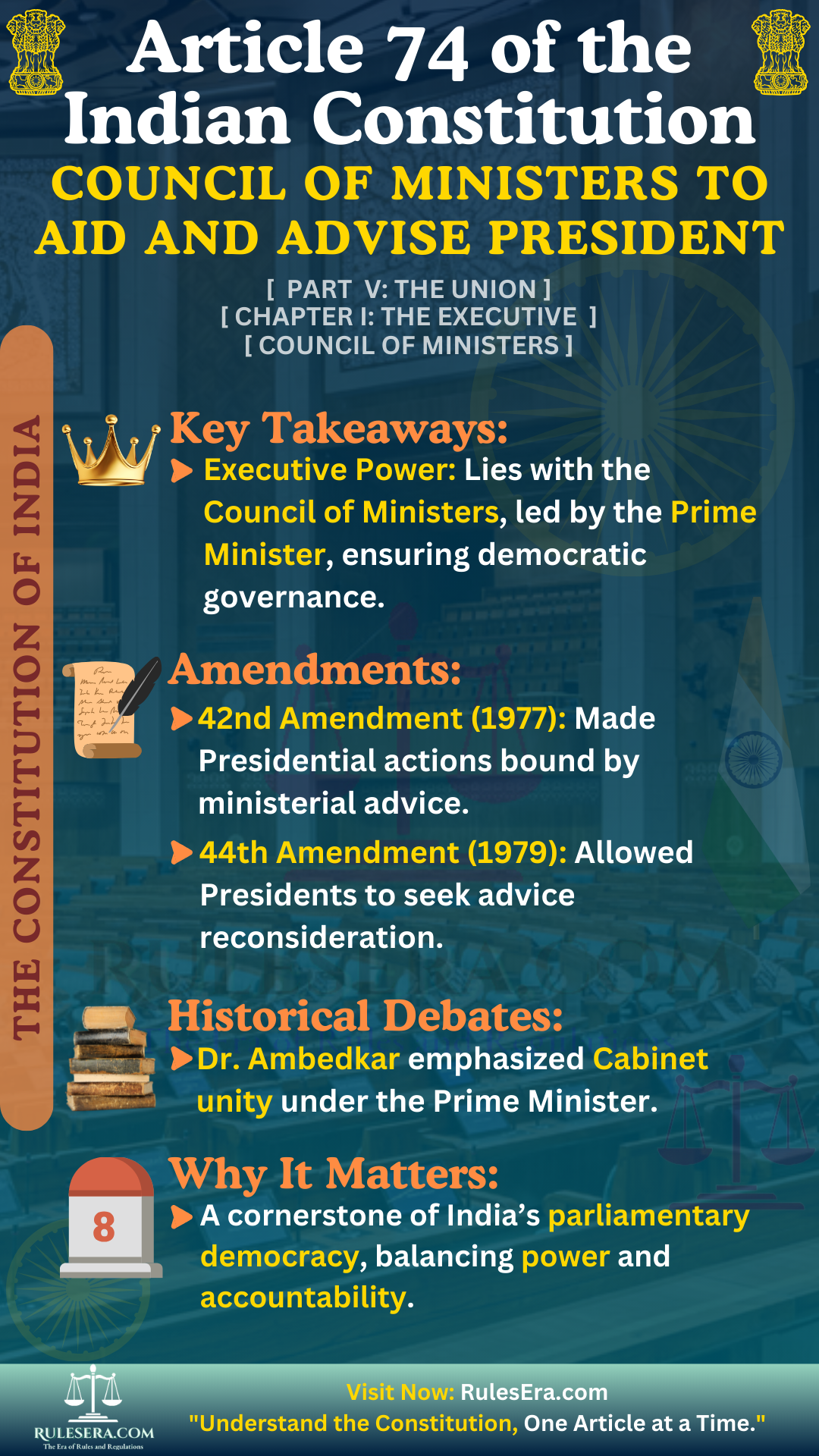Part V: The Union
Chapter I: The Executive
Article 74: Council of Ministers to Aid and Advise President

--- Original Article ---
Article 74 of the Constitution of India establishes the Council of Ministers, led by the Prime Minister, to aid and advise the President in the exercise of his functions. This provision underpins the parliamentary system, ensuring the President, a largely ceremonial figure, acts on the advice of elected representatives. It reflects a democratic structure where executive power lies with the Council of Ministers.
Clause (1): Council of Ministers to Aid and Advise the President
The first clause stipulates that the President must act in accordance with the advice given by the Council of Ministers, headed by the Prime Minister. This amendment was introduced through the Constitution (Forty-second Amendment) Act, 1976, clarifying the President’s role as largely symbolic, ensuring government decisions are rooted in the advice of elected ministers.
Amendment: This clause was revised by the 42nd Amendment (effective 3 January 1977) to ensure the President must act as per the advice of the Council of Ministers.
Real-life example: During President Fakhruddin Ali Ahmed’s tenure in the 1970s, ambiguity over the President’s powers existed. The 42nd Amendment clarified this, reflecting the will of the elected government, particularly during the Emergency era.
Proviso to Clause (1): President’s Right to Reconsider Advice
Added by the Constitution (Forty-fourth Amendment) Act, 1978, this proviso allows the President to request the Council to reconsider their advice. After reconsideration, however, the President is bound to act on the final advice.
Amendment: Inserted by the 44th Amendment (effective 20 June 1979), it limited the President’s discretion, especially following the Emergency, restoring a balance of power.
Example in practice: In 1997, President K.R. Narayanan asked Prime Minister I.K. Gujral to reconsider advice on dismissing the Kalyan Singh government in Uttar Pradesh. After reconsideration, Narayanan accepted the advice, showcasing the practical utility of this mechanism.
Clause (2): Advice Not to be Inquired by Courts
Clause (2) ensures that the advice tendered by the Council of Ministers to the President remains confidential and beyond judicial scrutiny, maintaining the sanctity of executive decision-making.
Historical significance: This clause is vital for preserving the separation of powers and ensuring that courts do not intrude into executive matters.
Real-life example: During the 1984 imposition of President’s Rule in Punjab, this provision helped avoid potential judicial scrutiny, preserving the confidentiality of executive decisions.
Historical Significance
The amendments to Article 74 reflect India’s evolving political system, especially post-Emergency. The 42nd Amendment concentrated power within the executive, while the 44th Amendment rebalanced it, allowing limited Presidential discretion.
Legislative History
Originally drafted as Article 61, Article 74 was debated on December 30, 1948, and subsequently incorporated into the Constitution.
- 42nd Amendment (effective 3 January 1977) substituted the original clause.
- 44th Amendment (effective 20 June 1979) added the proviso, restoring balance post-Emergency.
Constituent Assembly Debates
During the Constituent Assembly debates, Mahboob Ali Baig Sahib Bahadur proposed an amendment advocating for a more representative Cabinet. He suggested that the Council of Ministers include fifteen members elected by both Houses of Parliament, using proportional representation with a single transferable vote. One of these ministers would be chosen as the Prime Minister in the same manner, reflecting a broader cross-section of the populace and minimizing single-party dominance.
He argued that this system, drawing inspiration from Switzerland's example, could lead to a non-partisan approach where parties would not dominate, allowing ministers to be chosen based on merit and public support. This, he believed, would reduce internal conflicts and ensure a stable government.
In response, Prof. K.T. Shah proposed amendments to remove the explicit reference to the "Prime Minister at the head" of the Council, favoring a system where individual ministers could be replaced without disrupting the entire government. He argued that specifying a Prime Minister could concentrate excessive power in one role, risking democratic principles.
Dr. B.R. Ambedkar responded by stating that fixing a specific number of ministers was impractical since administrative needs vary. He stressed that the Prime Minister, as the leader, should appoint ministers from the elected House, which upholds democratic principles. He also noted that the draft Constitution already included provisions for minority representation, making additional statutory requirements unnecessary.
Ultimately, after Ambedkar’s clarifications, the Assembly rejected the proposed amendments. The draft article was incorporated into the Constitution without modifications, preserving the democratic principles of a parliamentary system where the Prime Minister leads the Council of Ministers, collectively responsible for governance.